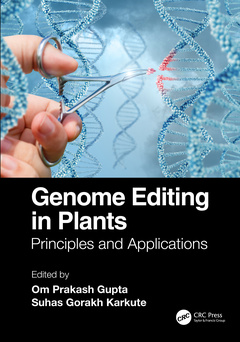Description
Genome Editing in Plants
Principles and Applications
Coordinators: Gupta Om Prakash, Karkute Suhas Gorakh
Language: English
Subjects for Genome Editing in Plants:
Keywords
GE; ZFNs; Genome Editing Technology; CRISPR Locus; CRISPR; Cleavage Domain; CRISPR Cas9 System; Target DNA; ZFN Technology; CRISPR System; Genome Editing Tools; Cas9 Mediated Genome Editing; TAL Effector; Hairy Root Transformation; HEs; Target DNA Sequence; Genome Editing System; Abiotic Stress; CRISPR Array; Tale Protein; DNA Cleavage; Eukaryotic Translation Initiation Factor 4E; Donor Template DNA; DNA Bind Domain; Soya Bean
· 17.8x25.4 cm · Hardback
Description
/li>Contents
/li>Readership
/li>Biography
/li>
Genome Editing in Plants: Principles and Applications addresses the information of genome editing starting from principles and historical aspects to the latest advancements in the field. As genome-editing technology has emerged as promising and cutting edge, researchers around the world have started producing original research outputs, which have significantly improved our current understanding and potential of this technology. The initial chapters of this book describe different genome-editing tools as well as their principles and applications. Other chapters are dedicated to the present status and future applications of genome-editing techniques in various crop improvement programmes. Some of the advanced applications of CRISPR/Cas tools, such as base editing and RNA detection, along with regulatory aspects of genome-edited crops are described in detail.
This book serves as a valuable resource to researchers in the field of crop improvement; graduate and postgraduate students engaged in plant molecular biology and biotechnology; academicians; and policy makers.
Key Features:
- Addresses topics associated with historical development and principles of genome-editing technology
- Addresses basic mechanisms operating under each genome-editing technology
- Addresses its application in plants to design crops as per the current and future demands
- Addresses the regulatory mechanisms of genome-edited crops
Historical developments of genome editing in plants. Mechanism of ZFN Mediated Genome Editing: Scope and Opportunities. TALEN: customizable molecular scissors for tailoring newer types of genomes in plants. Mechanism of CRISPER/Cas9 mediated genome editing: Scope and opportunities. Genome editing in wheat and millets. Genome Editing for Improvement of Rice. Genome Editing using CRISPR/Cas systems in Legumes. Genome editing in oilseed crops. Towards “CRISPrY” vegetables: status of genome editing in vegetable crops. Genome editing in fruit tree crops: Prospects and challenges. Genome Editing for Metabolic Engineering in Plants. Genome Editing in Algae: Perspectives and Challenges . Plant genome editing in basic research to understand molecular functions. Genome editing in plant: Challenges and opportunities. Regulatory approaches for genome edited crops. Advances in Genome editing.
Om Prakash Gupta, PhD, received his M.Sc. and Ph.D. from Chandra Shekhar Azad University of Ag. & Technology, Kanpur and ICAR-Indian Agricultural Research Institute (IARI), New Delhi, respectively. He is presently working as scientist (Plant Biochemistry) at ICAR-Indian Institute of Wheat and Barley Research (ICAR-IIWBR), Karnal.Dr. Gupta has more than 10 years of research experience in the area of Plant Biochemistry and Molecular biology and has significantly contributed in deciphering the role of small RNA during various biotic and abiotic stresses, biofortification, marker development, nutritional and processing quality etc. He has co-developed three genetic stocks and one bread wheat variety suitable for various quality traits.
Dr. Gupta has been bestowed with more than 80 publications to his credit which includes 30 research and review papers, 20 book chapters, 4 books, 30 popular articles. He presented his research papers in several national and international symposia/ workshops/ conferences. He has immensely contributed in resource generations through several externally funded projects funded by Indian agencies like DBT & DST, and International agency including CIMMYT. Dr. Gupta is also involved in teaching Fundamentals of Molecular Biology course to PhD students. Due to his immense research contributions, Dr. Gupta has been serving as editorial board members and reviewers of many international journals. Due to his outstanding contribution in research and meritorious profile, Dr. Gupta has the distinction of receiving numerous honors, fellowships and awards in recognition to his excellent academic and research contributions. He is fellow of the Society for Advancement of Wheat and Barley Research (SAWBAR), and received several awards including JawaharLal Nehru Award for outstanding Doctoral thesis by ICAR, University Silver Medal, Aspee Gold Medal and Dr. Kirtikar Memorial Gold Medal, ChowdharyCharan Singh Memorial Award du
These books may interest you

Targeted Genome Editing Using Site-Specific NucleasesZFNs, TALENs, and the CRISPR/Cas9 System 168.79 €



